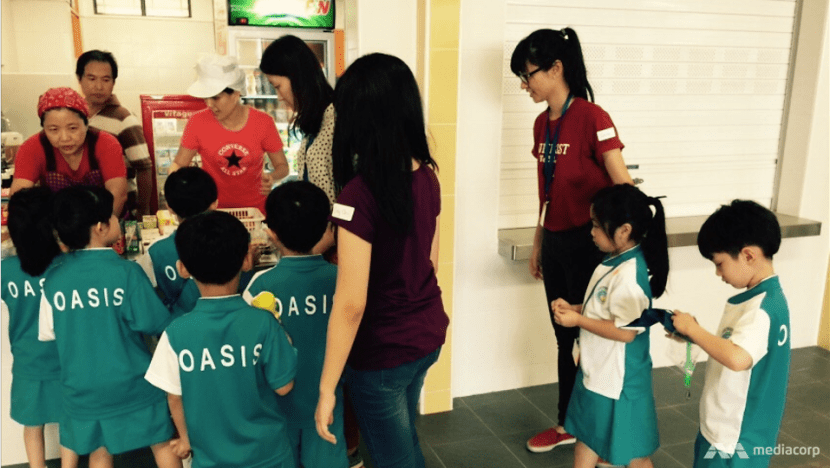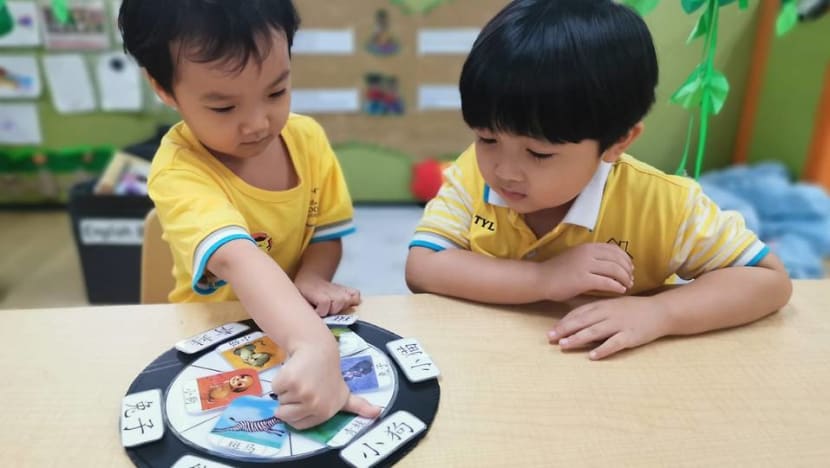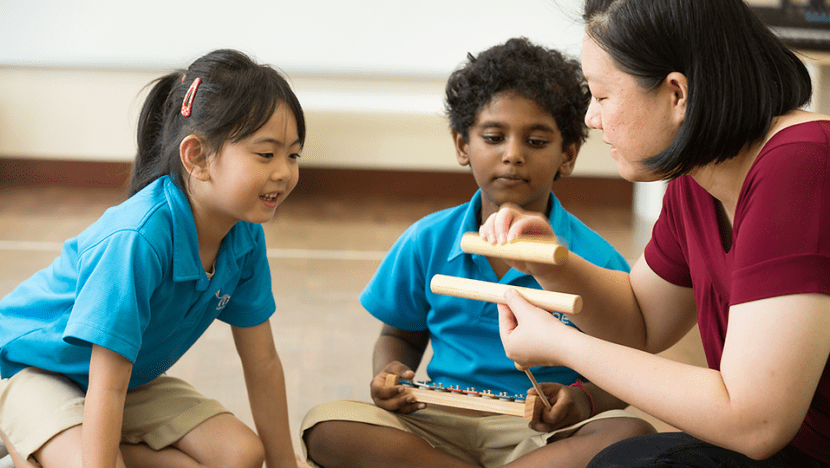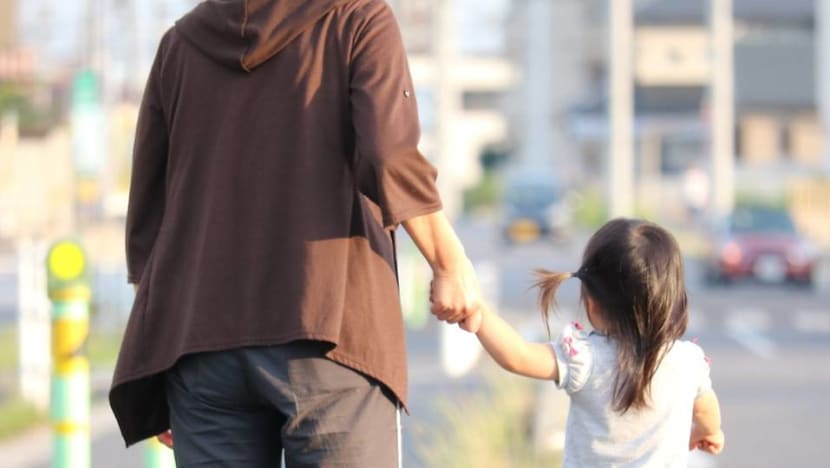commentary Commentary
Commentary: Getting kids ready for primary school has to start even before they attend pre-school
A new programme that was announced to help children transit from pre-school to primary school is laudable, but getting all children uniformly ready for formal schooling should start as early as possible, says an early childhood educator Dr G Kaveri.

Volunteers helping Primary One students buy food during recess. (File photo: Hetty Musfirah)
SINGAPORE: Although pre-school education in Singapore is not compulsory, the majority of young children are registered in pre-schools before entering the mainstream system of education.
The pre-school landscape presents over 1,900 childcare centres and kindergartens that offer a wide-ranging fee structure that can range from as low as a few dollars to over S$2,000 a month, depending on whether there are subsidies, full or half-day programmes.
Without a centralised curriculum, pre-schools plan and implement learning experiences that cater to the needs and interests of the children and families they work with, thus presenting an array of curriculum approaches resulting in uneven learning experiences for young children across various settings.
READ: Commentary: Why do parents still pay top dollar for pre-schools when there are more affordable options?
Yet, when young children arrive at Primary 1, they are generally expected to demonstrate a general set of “readiness”.
For instance, they need to show cognitive skills – counting and reading - take part in cooperative goal-directed activities such as putting up a performance at the end of a performing arts lesson and show they are able to initiate and sustain interaction with peers and of course, follow a teacher’s instructions.
Yet at pre-school, depending on the type of school, there are different emphasis on these skills. This means children don’t start at the same line.
For example, a child attending a Montessori environment learns practical life and sensorial exercises in a self-paced manner along with literacy and numeracy. The chronological sequencing of learning experiences in this programme is said to facilitate decision-making, responsibility, and completion of tasks in an organised manner.
READ: Commentary: Why we need to teach pre-schoolers protective skills to stop child sexual abuse
Socio-economic status, in particular income disparities, add one more layer of complexity, causing additional pressures to children from disadvantaged backgrounds.
Children from families that can set aside additional resources for enrichment programmes such as outdoor play experiences and speech and drama lessons have more opportunities to strengthen their social and behavioural skills compared to those from disadvantaged backgrounds.
According to the Economic Policy Institute, children from higher socio-economic status in general score better on social and emotional skills. These gaps can become more pronounced and pose risks to children’s academic achievement, their overall well-being and the well-being of communities, says OECD.
HELPING KIDS AT PRIMARY ONE IS A GOOD START
It is heart-warming to know that children with readiness related issues are identified right at the start of primary one and provided with necessary support through initiatives such as Transition Support for Integration Programme (TRANSIT) that will be run in all primary schools by 2026 - through role play, independent practice and coaching by teachers.

This was announced by Minister of State for Education Sun Xueling on Mar 3 during the ministry’s committee of supply debates in Parliament.
TRANSIT aims to provide both learning and behavioural support for primary one going children, with the focus on facilitating their transition into the mainstream environment.
It is unquestionably a well-directed move because moving into primary school is an important jump for children and this programme acknowledges the importance of young children’s potential and aims to tap the optimal growth and development of every child.
Providing structured assistance to children in need of social and behavioural support will mean individualised and small group-based sessions to assist children to learn the necessary skills to work in groups and to self-regulate.
WHY WAIT TILL PRIMARY SCHOOL?
While this kind of initiative creates an enabling environment for children with social and behavioural needs, should we wait until Primary 1?
READ: Commentary: Children from low-income families and the power of ‘significant adults’
Research has shown that early childhood years are when the critical foundations of social and emotional learning are laid. This is especially pertinent in the case of children who come from more disadvantaged backgrounds, especially those experiencing toxic stress.
Complex family backgrounds coupled with poverty can expose young children to toxic stress that can be unfavourable to their growth and development, and overall well-being.
According to the Centre on the Developing Child at Harvard University, prolonged exposure to factors such as marital conflict, neglect or financial hardships can increase the risk for cognitive impairment and damage social and behavioural outcomes in children.

Such childhood experiences are said to be closely associated with externalising and internalising behaviours. Examples of such behaviours include verbal bullying, non-compliance, tantrums and anxiety.
Such stress can be reversed or prevented through early and consistent child-centred interactions – naturally, the earlier the better.
Despite pre-school education not being compulsory, the majority of our children receive some sort of pre-school experience before entering the mainstream education.
This demonstrates the presence of young children in the care of trusted adults during their formative years, thus making the case for laying the foundations for social and behavioural learning during pre-school years.
Experts from ZERO to THREE, a global non-profit organisation on advocating child development, say adults in the child’s immediate environment can foster school readiness as early as birth.
For example, playing turn-taking games with toddlers such as passing the ball helps them to gradually learn and practice self-regulation, a critical skill for “readiness” in mainstream education.
When adults in the immediate environment establish consistent routines such as packing away toys before a meal and reading a book before bedtime, children learn both positive and responsible behaviours.
READ: Commentary: Giving up petrol cars is a lot more difficult for parents
While pre-schools do make an effort to strengthen readiness – they can tap on the key tenets of the TRANSIT programme to weave it into their own instructions in a systematic way that will help all children meet these social and behavioural milestones required of at the start of formal schooling.
While for most children acquiring such skills can happen quite quickly, some may need additional time and resources and this may be better done in the pre-school setting.
Through careful and systematic observations, early childhood educators can identify young children in need of additional support that requires intentional and systematic planning of instructions.
For example, for a child who has difficulties waiting for his or her turn, the teacher can explicitly teach the skill by introducing it, demonstrating when it is used, and providing several opportunities to practice it.
Such intentional practices when consistently weaved into day-to-day routines and interactions can help see positive outcomes in children so that they are helped even before they start formal education, making transitions easier.
WORKING WITH FAMILIES
While we make the case for such intentional experiences to happen in greater intensity in pre-schools, it is important to remember that families are children’s first educators.

Young children’s social and emotional learning is closely related to quality parent-child relationships. Initiatives supporting children’s social and emotional learning can be fruitful only when we draw on the expertise of the families, thus advocating for collaborative relationships between pre-schools and families.
When combined, the knowledge and expertise of both early childhood educators and families is proven to enrich young children’s social and emotional learning.
However, this also raises the question of parents’ readiness to strengthen young children’s social and emotional development at home, thus also making the case for parent education programmes with an increased focus on equipping parents with relevant knowledge and skills to strengthen children’s social and emotional well-being.
Ideally, all parents, whatever their socio-economic status in life, can be involved in getting their children ready for formal schooling.
READ: Commentary: Don’t expect your kids to return to school seamlessly
READ: Commentary: With or without masks, our kids have surprised us with their adaptability
And pre-schools can play a part in disseminating information, partnering them by supporting and encouraging good practices to continue at home and during long holidays.
Earlier intervention is critical in ensuring that all children get off the starting block of formal school without too much difficulty.
Dr G Kaveri is an Early Childhood Education lecturer at the S R Nathan School of Human Development, Singapore University of Social Sciences.












